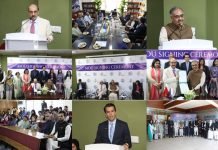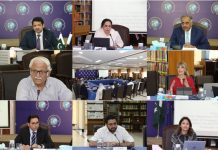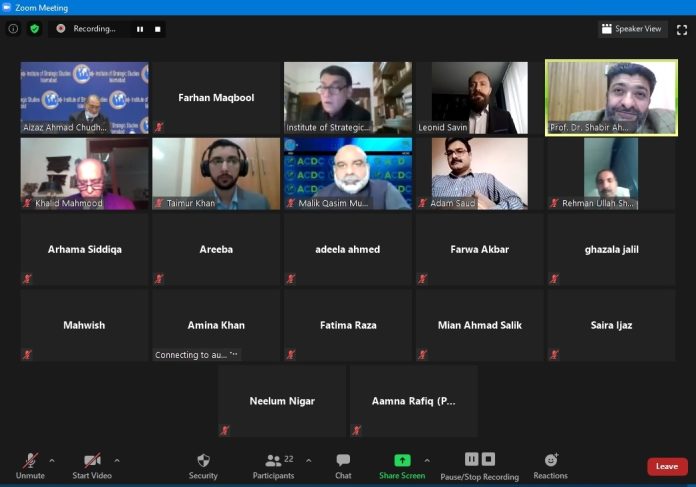Press Release
Panel Discussion
on
“Pakistan and Russia: Challenges and Opportunities for a Comprehensive Relationship”
Center for Strategic Perspective (CSP) at the Institute of Strategic Studies Islamabad (ISSI) organized a panel discussion on “Pakistan and Russia: Challenges and Opportunities for a Comprehensive Relationship” The panel comprised of esteemed academics and scholars including: Dr. Leonid Savin, Geopolitical Analyst, Chief Editor at Geopolitca and Member Military-Scientific Society MoD; Prof. Dr. Shabir Ahmed Khan, Director (Russia, China & Central Asia), University of Peshawar; Prof. Dr. Adam Saud, Dean of Faculty of Humanities and Social Sciences, Bahria University, Islamabad; and Mr. Taimur Khan, Research Associate, CSP-ISSI.
The discussion began with introductory remarks by Director CSP and Editor at ISSI Mr. Najam Rafique. He mentioned two major developments in Pakistan-Russia relations which have taken place in November 2020: Russia’s infrastructure assistance in North-South gas pipeline project, and Pak-Russia joint military exercises (Druzhba-V). After referring to a few more positive developments, he said that it was in this background that CSP is holding this panel discussion.
Posing a question to Dr. Leonid Savin, Mr. Najam asked how Russia views its relations with Pakistan. Responding positively to this answer, Dr. Savin said that though there is still lack of knowledge about Pakistan in his country, Russia is nurturing it relations with the former. Despite the Soviet legacy and historical baggage between the countries, the Russian scholar stated, economic and military cooperation is facilitating them to move into a productive engagement. The realization of Pakistan’s utility can be seen in various developments such as China-Pakistan Economic Corridor (CPEC) and membership of Shanghai Cooperation Organization (SCO). Regarding Mr. Najam’s query on Russia’s future posture in Afghanistan, Dr. Savin responded that his country has always supported peace in Kabul and it will continue to do so in the future as well. To another question on Moscow’s role in Asia-Pacific and Washington’s recent mobilization of QUAD, the Russian scholar highlighted a few important engagements in the region and said that his country will play a constructive role in the coming days.
Responding to a question on the nature and dynamics of the evolving bilateral relations between Pakistan and Russia, Director General ISSI, Amb. Aizaz Ahmad Chaudhry said that it is America’s Pivot to Asia and China’s overall growing clout in the region and the world that has brought shifts in many state-to-state alignments. The current trajectory of Pak-Russia relations, in his opinion, was an eventual product of these developments. Recalling an official meeting with President of Russia, Vladimir Putin, he said that he found the President personally interested in building substantial relations with Pakistan.
Moving on to the next panelist, Mr. Najam engaged Dr. Shabir for his opinion on the different avenues of cooperation which can be capitalized by Pakistan and Russia to build a comprehensive and durable long-term relationship. Dr. Shabir was highly optimistic of the nature and dynamics of the relations. However, he particularly highlighted the need to strengthen relations by connecting Russia and Central Asian countries with Pakistan through Afghanistan. He suggested to connect North-South connectivity project with Russian and Central Asia via Afghanistan. He highlighted education, food, agriculture, and energy as possible areas for cooperation.
Sharing his views on how the ambit of military cooperation can be expanded, Prof. Dr. Adam Saud pointed to strengthening the core of the bilateral relations which, according to him, was perception management and mutual understanding on both sides. He proposed to gradually strengthen military cooperation through SCO and technological cooperation in the field of civil nuclear assistance. He said that both countries can arrange road shows, increase cooperation on technical education, tourism, people-to-people contact and medical vaccine development for building a close bilateral cooperation.
Requested to speak on how both countries can cooperate to ensure durable peace in Afghanistan, Mr. Taimur Khan listed a number of areas of convergence for Moscow and Islamabad. He highlighted Afghanistan as a major converging point of interest. He was of the opinion that US-India strategic partnership can be a major determinant of Pak-Russia relations. He also suggested expanding CPEC-related activities in the region to Russia.
When asked for his assessment on Pak-Russia relations in the changed geopolitical and geo-economic circumstances, Chairman BOG-ISSI, Amb. Khalid Mahmood said that transformation of Soviet Union into Russian Federation was a pivotal point which, with the recent Sino-Russia bonhomie, has become a driving factor for current warmth in Moscow-Islamabad ties.
Mr. Najam concluded the discussion on the note that the past, present and future difficulties can be removed by creating substantive collaboration and understanding on Pakistan within the Russian political and academic circles.












